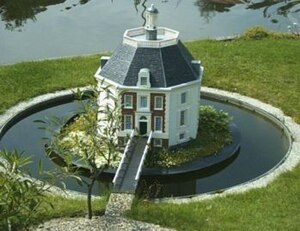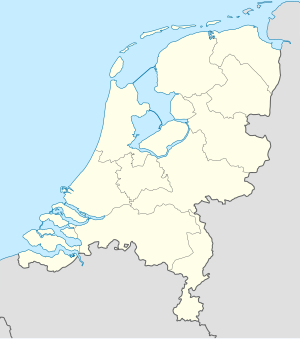Drakensteyn Castle: Difference between revisions
replace {{ref}}/{{note}} with <ref>/{{reflist}} |
m Bot: Migrating 3 interwiki links, now provided by Wikidata on d:q1783601 |
||
| Line 60: | Line 60: | ||
{{Utrecht-geo-stub}} |
{{Utrecht-geo-stub}} |
||
{{Netherlands-struct-stub}} |
{{Netherlands-struct-stub}} |
||
[[fy:Drakesteyn]] |
|||
[[nl:Drakensteyn]] |
|||
[[no:Slott Drakestein]] |
|||
Revision as of 19:22, 6 March 2013
| Castle Drakesteijn | |
|---|---|
| Lage Vuursche, the Netherlands | |
 A model of Drakesteyn in Madurodam | |
 Engraving by Hendrik Spilman after Jan de Beijer (1750) | |
| Coordinates | 52°10′47″N 5°13′38″E / 52.17972°N 5.22722°E |
| Type | Castle |
| Site information | |
| Owner | Queen Beatrix |
| Open to the public | No |
| Condition | Good |
| Site history | |
| Built | 1640 |
| Built by | Gerard van Reede |
Drakesteijn or Drakestein is a small castle at 9 Slotlaan in the hamlet of Lage Vuursche, in the municipality of Baarn. The owner is Queen Beatrix of the Netherlands. Beatrix bought the castle in 1959, when she was the Crown Princess, and took up residence in 1963. After her marriage in 1966 she continued to live there with her husband, Prince Claus and later their three sons as well. After Beatrix succeeded her mother Juliana as Queen of the Netherlands in 1980, the family moved to The Hague in 1981.
On January 28, 2013, it was announced [1] that Beatrix will take up residence at the castle at some point after the investiture of her son, Willem-Alexander, to the Dutch throne on April 30, 2013.
A house called Drakesteijn at this location was first mentioned in 1359, but the current building was constructed in the years 1640–1643 for a Gerard van Reede. It should not be confused with the nearby Klein Drakesteijn ("Little Drakesteijn"; located at 4 Kloosterlaan), which was built in 1780.[2]
The royal connection aside, its most distinctive feature is its octagonal shape. It is surrounded by a moat that can be crossed via a bridge. Its style can be described as Classicist.
References
- ^ http://www.koninklijkhuis.nl/globale-paginas/taalrubrieken/english/news/
- ^ Kolman C., et al. (1996). Monumenten in Nederland: Utrecht, p. 138–139. Zwolle: Waanders Uitgevers. ISBN 90-400-9757-7.
See also

